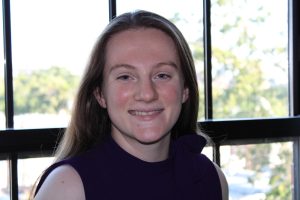
Izze Hedrick, a fourth-year double major in materials science and engineering and physics, was named a 2022 Astronaut Scholar by the Astronaut Scholarship Foundation, a nonprofit founded by six of the Mercury 7 astronauts to inspire, encourage, and facilitate the next global leaders in technology. Given annually to about 60 of the country’s brightest and most talented college students studying science, technology, engineering and mathematics, the award provides winners with $15,000 to use over two semesters, as well networking and mentorship opportunities.
Hedrick, who won the award in part for her research in quantum mechanics and computing, traveled to the Kennedy Space Center in Cape Canaveral, Florida last summer for a four-day event that included a tour, leadership seminars, and networking with former and current award recipients.
“It was really cool to see the space center. Every year, they have astronauts present it. I met Apollo 17 astronaut and former U.S. Senator Harrison Schmitt and International Space Station crewmember and Space Shuttle astronaut Nicole Stott, got their autobiographies, and learned a lot about the space industry as a whole. From a materials standpoint, it was cool to learn about the rockets and see objects that have gone to space and come back down. I was one of three material scientists there out of the 68 award recipients. We had a lot of fun looking at heat shields and discussing why they corroded,” says Hedrick, whose application for the scholarship program was supported by her research mentor, Tyrel McQueen, a professor in the Krieger School of Arts and Science’s Department of Chemistry and an associated faculty member in the Whiting School of Engineering’s Department of Materials Science and Engineering, and her first-year adviser, Jim Spicer, a professor in the Department of Materials Science and Engineering.
As part of the Astronaut Scholarship Program, Hedrick, who wanted to learn more about technical aspects of how research integrates with industry, has been paired with a mentor in the field of software and development who is teaching her about the patenting process. But she says they also talk about soft skills, such as communication and leadership.
Hedrick’s research lies at the intersection of physics and materials science. Two of her current projects focus on the use of superconductors in quantum computing.
“I want to make quantum computers as efficient as they can be in the materials phase. I research materials for applications as two specific types of qubits, or quantum bits. I’m also working on finding new fabrication methods to examine how oxide formation impacts qubit performance, which could help qubit systems scale more efficiently and make materials research in this field more linear. These are two directions I want to further explore in the future” she said.
Hedrick also recently received a Provost’s Undergraduate Research Award (PURA) for her project with McQueen entitled “Examining Vacancy Defects in CeO2-x for Tunable Optical and Electromagnetic Applications in Cryogenic Quantum Computing.”
Hedrick says this work is something she’s always wanted to do. “Obviously I wasn’t 10 years old saying I wanted to make quantum computers, but I knew I liked physics. I knew I like chemistry because I liked mixing things that I found in my parents’ bathroom closet,” she says. After two years in a STEM magnet high school in her home state of Kentucky, she attended an early college program that allowed her to take college courses focusing on physics and higher math.
“That gave me a better idea of where I wanted to go and what I could do here at Hopkins,” she said.
Hedrick has also continued pursuing her other interests in her time at Hopkins, playing rugby and learning Russian, which she describes as “a good break from STEM”
She also hopes to share her passion of quantum computing research with other students, as she says that as an underclassman, she was unaware of the avenues within JHU for this type of research.
“I hope any underclassmen interested in this research will come find me. I would love to talk to them about it,” she said.